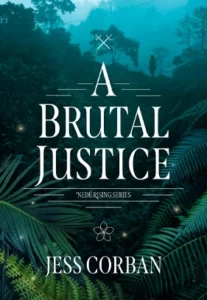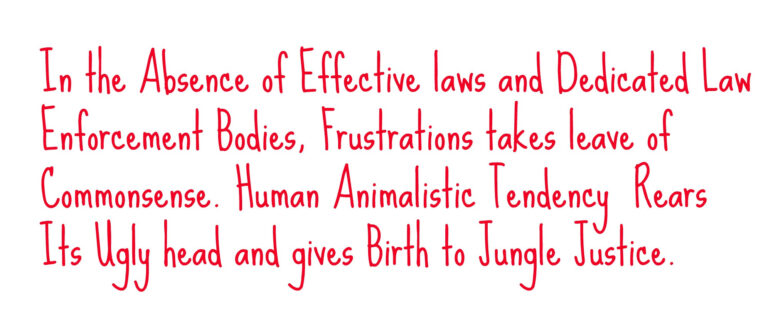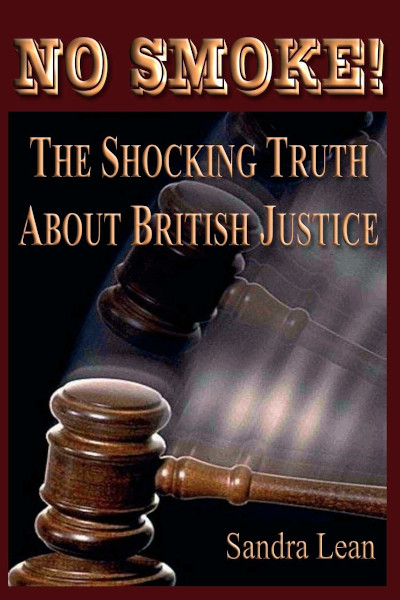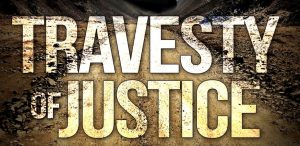

In afwezigheid van effectieve wetten en toegewijde handhavingsinstanties neemt frustratie de overhand.
De dierlijke neiging van de mens steekt zijn kop op en leidt tot jungle-justitie.

1 The case Liam Allan is a simple example that shows we are dealing with
‘Justice is a jungle’
It is a wild and dangerous place.
Destructive like a predator towards its prey,
or pure arbitrariness like a dictator.
(As we see in the examples in point 2 on the homepage.)
You can’t imagine it, someone can lie through their teeth – for no reason –
to put the blame on someone about something that never happened
and where nothing is wrong – with evidence on file –
in order to disrupt or destroy someone’s life overnight.
Such a thing is no longer justice.
The question that needs to be asked beforehand is:
what is actually going on here?
It is the enigma of faulty human behaviour
(like a predator or dictator),
on an ordinary human who has done no wrong.
What is the trigger that leads one to shatter the lives
of people who have done nothing wrong,
in e.g. the ten first cases on the home page?
(Liam Allan and the list of nine in point 2)
It is the hard question that applies to every particle of the entire website!
2 Opening the eyes for the evils of justice
Justice can flatten someone based on fantasy
The word justice is used to do very wrong things.
A questionable context is created that cannot be related to the person.
This leads to a destructive pattern of trying to paint an unworldly picture that raises eyebrows
because it does not match the person as he is known by all.
Therefore, when it becomes apparent that we are dealing with something that has been put together in a forced manner, in other words, something that is not at all credible or, in other words, not applicable to the person (as with the extreme examples listed in point 2 on the hope page).
Another example, winning the marathon you didn’t run. Rosie Ruiz: The Woman Who Cheated the Boston Marathon.
It is an apt example, because one can’t think of anything more crazy. But it really did happen.
Justitie kan iemand platwalsen op basis van fantasie
Het woord justitie wordt gebruikt om erg foute dingen te doen.
Een twijfelachtige context wordt gecreëerd die niet kan in verband gebracht worden met de persoon.
Dit leidt tot een destructief patroon om een wereldvreemd beeld te schetsen die de wenkbrauwen doet fronzen
omdat het niet overeenstemt met de persoon zoals hij door iedereen gekend is.
Maar het is wel echt gebeurd.
Daarbij wanneer het opvalt dat we te maken hebben met iets die geforceerd in elkaar is gestoken m.a.w. iets die in het geheel niet geloofwaardig is, of anders gezegd niet van toepassing is op de persoon (de extreme voorbeelden in bovenstaand lijstje).
Of zoals in een ander voorbeeld, de maraton winnen die je niet gelopen hebt. Rosie Ruiz: The Woman Who Cheated the Boston Marathon.
Het is een toepasselijk voorbeeld, omdat men het zo gek niet kan bedenken.
To summarise
- The justice system can treat people completely arbitrarily!
- Ordinary people who have nothing to do with what justice is acting against end up in a situation of ‘modern-day slavery’.
- One cannot imagine what is happening within the justice system, to deliberately act in a world-estranged, faulty manner.
- There are no words for the madness and foolishness with which justice operates in the examples on the home page, as further explained on the following pages under buttons Part 2 to Part 7.
- Despite available and/or known evidence that justice does not apply to these people, they disappear behind bars for endlessly long periods of time.
- It is bizarre that in a well-organized rule-of-law state, one can effortlessly use justice to bring clearly innocent people into trouble and ruin their lives, as evidenced by the examples.
- We are dealing with a consciously meaningless and destructive approach. A kind of justice that loses all credibility.
- Justitie kan mensen volstrekt willekeurig behandelen!
- Doodgewone mensen die niets te maken hebben met hetgeen waarvoor justitie optreed, komen in een situatie van ‘modern-day slavery’.
- Men kan het zich niet voorstellen, wat er zich afspeelt bij justitie, om bewust wereldvreemd fout te werk te gaan.
- Er zijn geen woorden voor, voor de verdwazing en foolishness waarmee justitie te werk gaat in de voorbeelden op de home pagina, zoals verder toegelicht op volgende pagina’s onder de buttons Part 2 to Part 7.
- Ondanks voor handen zijnde en of gekend bewijs dat justitie niet van toepassing is op deze mensen verdwijnen ze eindeloos lang achter de tralies.
- Het is bizar dat in een goed georganiseerde rechtstaat men moeiteloos justitie kan gebruiken om duidelijk onschuldige mensen in moeilijkheden te brengen en hun leven kapot te maken, zoals blijkt uit de voorbeelden.
- We hebben te maken met een bewust zinloos destructief te werk gaan. Een soort justitie die elke geloofwaardigheid verliest.


3 Raise Eyebrows – What’s the right thing to do?
Truth Be Told
You cannot rule out the possibility that the judiciary may overlook something and that it will end up all wrong with the dramatic consequence for those who incomprehensibly have a burden placed on their shoulders that they cannot be blamed for. In this regard, there are plenty of examples.
Je kunt niet uitsluiten dat justitie iets over het hoofd ziet en dat het helemaal verkeerd afloopt met het dramatisch gevolg voor zij die onbegrijpelijk een last op de schouders krijgen die ze niet kan de schoenen geschoven worden. Desbetreffend zijn er voldoende voorbeelden.
“Truth be told” is an idiomatic expression that is commonly used in English. It typically serves as a preface or introduction to a statement or revelation that the speaker believes to be honest, sincere, or candid. The key points of the expression “Truth be told” are:
Honesty: The phrase suggests that the speaker is about to reveal information that they believe to be true, without embellishment or deception. It implies a sense of candidness and sincerity in the forthcoming statement.
Authenticity: “Truth be told” conveys a sense of authenticity, indicating that the speaker is about to share genuine information or express their true thoughts or feelings.
Introspection: The phrase can also indicate that the speaker is about to disclose something that may be personal or introspective, revealing a deeper truth or insight about themselves or a situation.
Clarification: “Truth be told” can also be used to clarify a point, emphasizing that the forthcoming statement is accurate or factual, and should be taken as such.
Emphasis: The phrase can be used for emphasis, drawing attention to the importance or significance of the statement that follows, as if to say, “Pay attention, because this is the real truth.”
Overall, “Truth be told” is a phrase used to introduce a statement that the speaker believes to be genuine, honest, and accurate, often with a sense of personal authenticity or introspection.
Juste pour rire – Régiment gai, gai, gai
28 nov. 2012